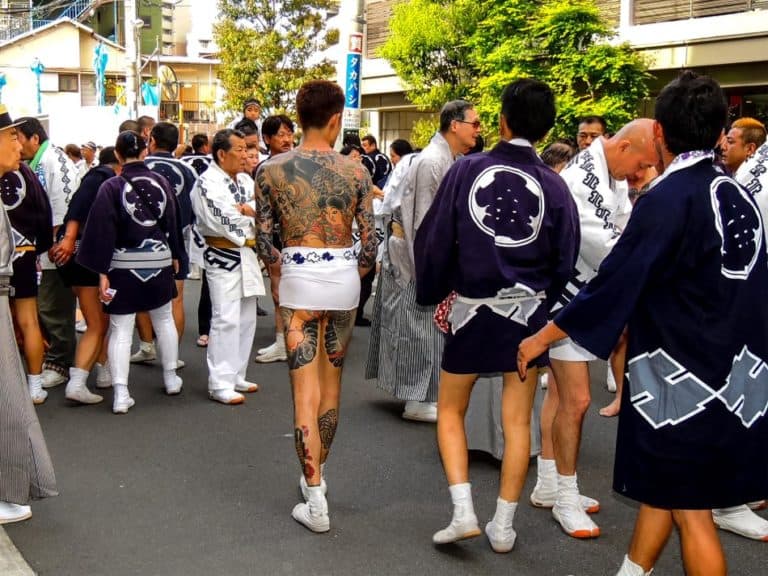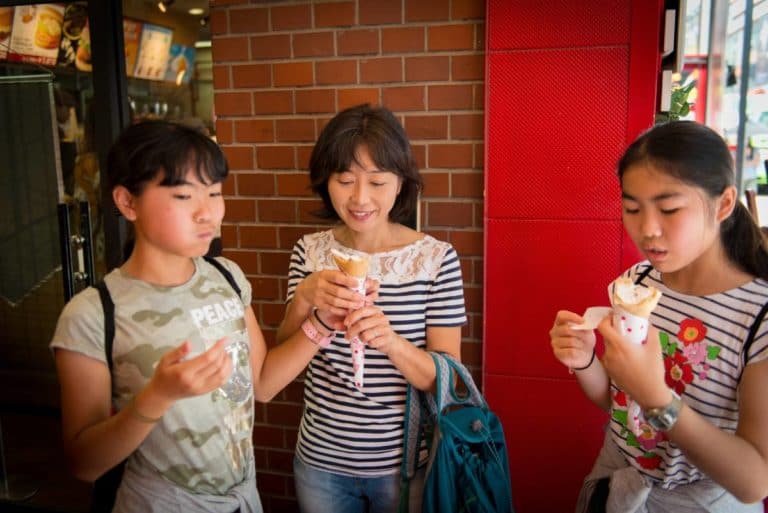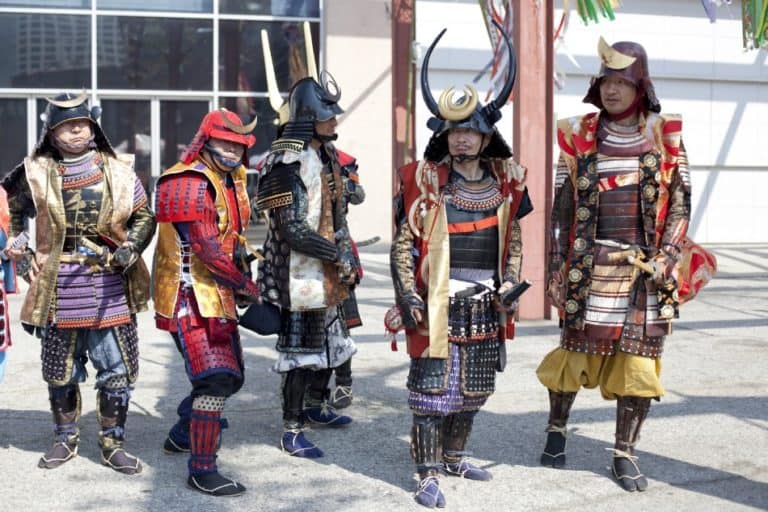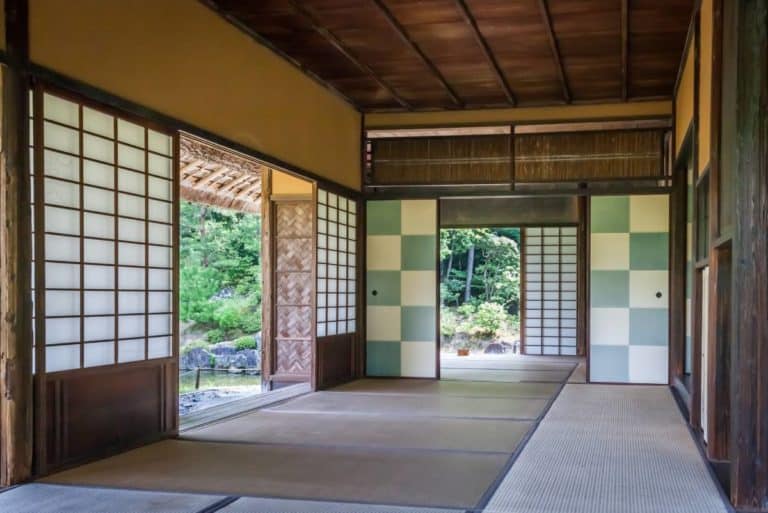10 Strange Japanese School Rules That Will Shock You
Sometime back, there was news of a young Japanese girl having to dye her naturally brown hair black as instructed by the school authority.
As ridiculous as it sounds to people living outside of Japan, this incidence is quite common inside the country.
But are all Japanese schools packed with such peculiar ground rules? Let’s find out!
One of the strangest and some might even call the most dysfunctional rule is, without a doubt, the ‘no food from home rule. This rule makes zero sense, yet it is followed religiously by almost all school-going Japanese kids.
And this isn’t even the tip of the iceberg.
It’s safe to admit that most Japanese schools have odd rules ranging from borderline stupid to plain wrong.
They often cause anxiety among school-going kids who already suffer a lot of stress under the curriculum. But without much further ado, let’s look at ten strange Japanese school rules.
Why Are School Rules So Important to The Japanese?
Japan is a country known for its discipline and respectful lifestyle. Even if things get crazy in all the manga and anime, real life in Japan is not the same.
That’s even more obvious when you look at all the school rules they follow and realize how incompetent they sound.
The rules are enough to tick off an average school-going kid from outside Japan who might even take loathing for the Japanese teachers and their need to make the lives of their students miserable instead of filling them with desires to learn and be more creative.
But all these rules and regulations seem rational when you think about the classroom violence that Japan faced decades ago.
The amount of misbehavior and harmful activities that shaped these rules have since come a long way, and the majority of today’s generation would discard them if given the opportunity.
Nevertheless, the rules protect the students to a certain degree; some might even consider them essential and significant to the average Japanese.
Furthermore, there are also the chances of reliving the past if some of these rules are not implemented.
But at the end of the day, what’s the use of compelling young people to respect authority if they become mindless zombies?
Restriction of personal freedom is a grave offense and, therefore, should be dealt with accordingly.
10 Strange Japanese School Rules That Will Shock You
I’ve compiled some of the weirdest school rules many Japanese schools enforce here. Some of these might even be quite shocking based on where you’re from.
1) Necessity of School Uniforms
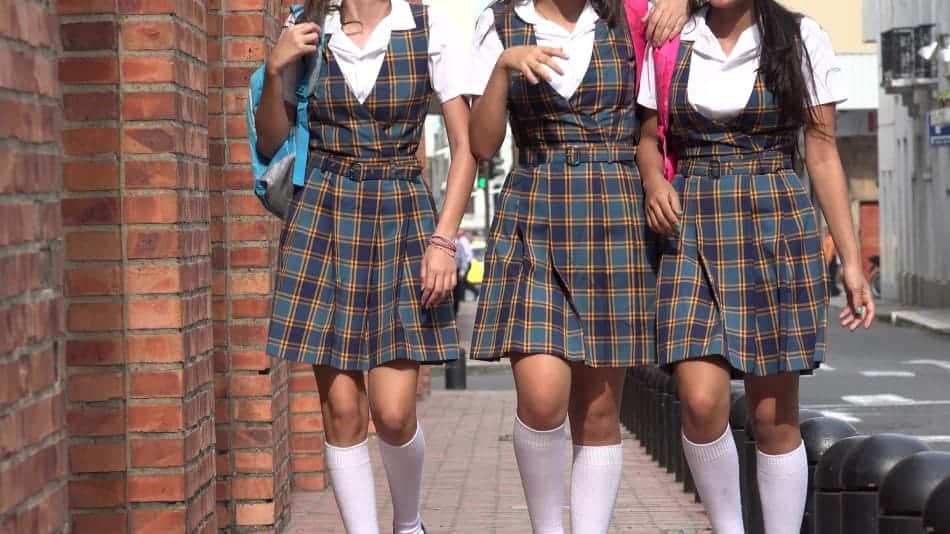
Japanese uniforms have been a trendsetter for decades, even though it was never the intention.
For Japanese school-going kids, uniforms play a significant role in their identity. And almost every school in Japan has a similar uniform; the girls are to wear plaid skirts while the boys wear black suits.
And that’s not even the tip of the iceberg. For the girls, the lengths of their skirts are to be a particular inch above their knees, which is, in most cases, 3 inches above them.
Even though some students find a way around it by folding their skirts at the waist to make them look shorter, they get punished if caught.
But that’s not the only thing female students have to worry about. When it comes to undergarments, it is mandatory for female students always to wear white undergarments to observe high levels of hygiene at school.
Female teachers will inspect the girls by taking them to a separate room.
2) Punctuality is a MUST

The Japanese pride themselves on being on time all time. So, it’s no surprise that punctuality is a massive deal at Japanese schools.
Unless a specific and verified urgent situation caused the student to be late, students cannot enter the school.
But it should also be mentioned that Japanese students are punctual and time conscious; thus, most always try to come to school on time.
Some of them even stay after school for other extracurricular activities and clubs.
3) No food From Home
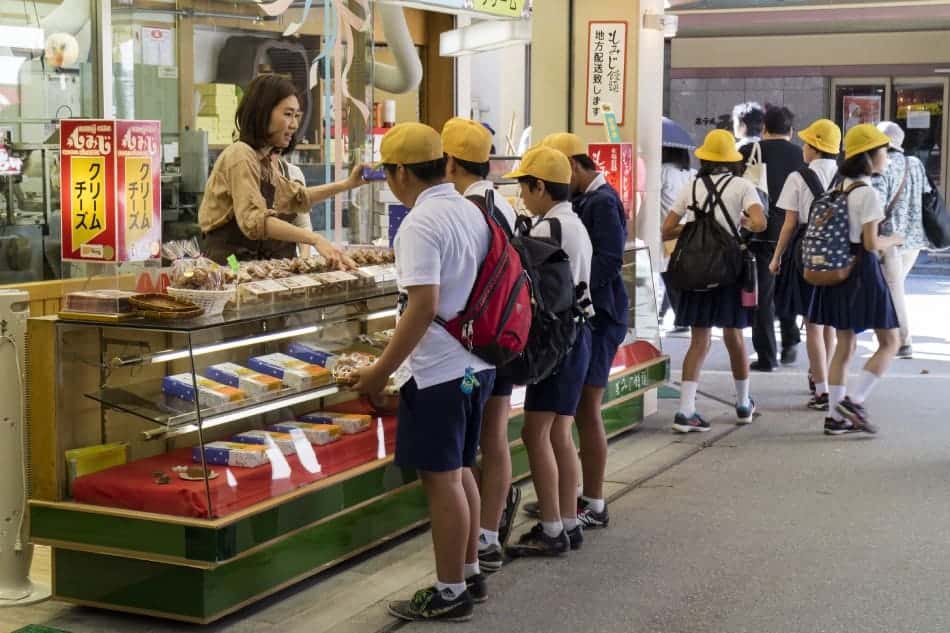
When it comes to primary and junior school students, they cannot bring food from home. They are provided with food from school during their meal times.
The menu ranges from soup, fish, or a bowl of rich, but it depends from school to school. And get this; the students are punished if they fail to finish their bowl of meal.
So, if we compare this with the Western world, where students go to the cafeteria to buy lunch or bring food from home, Japan follows none.
Instead, every school must provide food for the students so that no one misses their meal, even if they’re from an underprivileged background.
It might seem strange for those out of Japan, but this is wonderful to implement for Japanese schools.
Because in this way, no child will go home hungry, and they will have the energy to go through the remainder of their classes without missing a meal.
Of course, in higher grades, this rule doesn’t apply. This allowed their ”Bento” culture to rise, including bringing colorful, stylized, and nutritious home-cooked lunch boxes to school.
4) Importance of Greetings
Greeting one another is extremely important in Japanese culture. Students greet one another as well as their teachers.
Every morning, it is mandatory for all the students to greet their teacher once they enter the classroom formally. That is how they start their lessons.
Some schools even start the day with a morning meditation for the students and teachers. This way, the teacher and the pupil may begin the day with an outburst of positive energy, hoping to last for the entirety of the long school hours.
5) No Substitutes
This one is quite interesting and shows how disciplined Japanese students are. A substitute teacher does not take their place whenever a teacher is absent.
The class they are supposed to take is simply canceled, and the students only have the whole classroom for that period.
This is only possible because the students are either studying or maintaining strict discipline inside the classroom.
There is no chaos and thus no need for them to be monitored. The students thus do their schoolwork and continue studying without the guidance of a teacher.
6) Dying Hair is not Allowed
As mentioned earlier, a lawsuit was filed by an Osaka high school student who challenged her school after being demanded to dye her naturally brown hair black. This created quite a stir and caught the attention of foreign media.
Dying hair is not allowed in Japanese schools.
But what’s interesting is that if the students’ hair is naturally of a different color than black, they are either forced to color their hair black or show a certificate of proof that shows that their hair is actually of a different color than black.
So, it’s quite interesting when you realize that the Japanese are not worried about dyed hair, but their main focus is whether the students have non-black hair.
7) No Curly Hair
And this is not just a problem with colors. Girls with naturally curly hair are asked to straighten their hair to fit the school’s code.
They might also get denied entry if their hair is not neat or, in some cases if it looks too neat.
There have been instances of African Japanese students accused of getting a perm even though that was their natural hair texture.
Some are even forced to pin-straighten their hair because their natural hair does not look natural enough.
8) No Accessories Allowed
Students are prohibited from wearing any accessories at school as the authority claims that if they overly dress, they might get into trouble or land themselves in harm’s way.
Unsurprisingly, the schools won’t allow rings, bracelets, necklaces, or accessories. But even piercings are not allowed.
Earrings are considered too flashy; thus, students cannot pierce their ears and wear earrings at school.
9) No Romantic Relationships
Given such strict rules, I don’t think anyone would be surprised to know that Japanese schools don’t allow any form of romantic relationships to be displayed on the premises.
In some cases, students are often questioned if they are even getting a bit friendly with the opposite sex.
This will come off as bad news for someone if they develop a crush at school.
As relationships are strictly banned, you won’t be able to confess your feelings to your crush at school. Teachers consider this rule fair as students are still young to consider relationships.
10) Cleaning is Done by Students
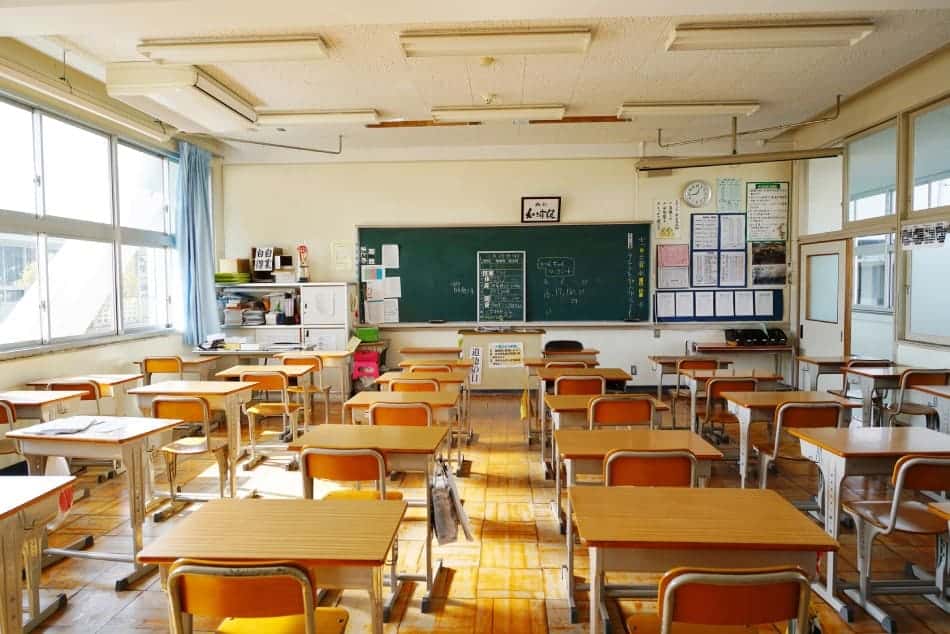
You won’t find janitors at Japanese schools, as the students do all the cleaning. All the students are equally responsible for cleaning their classrooms, bathrooms, and even the hallways.
You’ll see the students mopping the floors, dusting, and ensuring the chalkboards are always clean.
So not only do they stay clean themselves, but they also keep their surroundings tidy.
The Consequences of Such Rules
The rules may seem harmless from a broader perspective, but when you look deeper inside, some implications suggest that they do more harm than good to the students and their respective family members.
Let’s examine how these super-odd and strict rules negatively affect Japanese students and their families.
The Financial Burden
Starting with the financial burden: as mentioned before, her family faced a financial burden for the student who had to dye her naturally brown hair black.
This is also the case with many struggling families with difficulty bringing food to the table.
Being required to keep the hair a certain length and of a particular color requires students to purchase specific products, and oftentimes, this burden often falls upon the guardians.
This leads to added stress to the already struggling Japanese households.
Even the uniforms come at a price, which may seem unreasonable sometimes. But there is little to no room for the parents to do anything about it. The arrangements are always made between the school and the supplier merchants.
Harassment
As serious and deadly as these rules are, things are worse for those students who’ve already been marked as rebels by the teachers.
They are subjected to constant harassment disguised as guidance from the authorities. Even minor obstruction of the law is dealt with severe punishment for these kids.
The number of years a student spends at school is highly significant. Thus, the rules they follow have an essential impact on their daily lives as they grow up.
People from abroad will observe how people from Japan are always so disciplined and orderly. That is mainly because they are taught all those things early and follow them later in their lives. But nothing comes without a cost.
Harassment and bullying from classmates and teachers often have detrimental effects, which are, in most cases, irreversible.
To think that the very rules put in place to protect them would scar them for life.
Suicide
Japan already has high numbers of suicide rates, and in addition to that, the school regulations themselves are enough to kill the students.
Worse, the parents and school authorities sometimes overlook psychological stress and trauma.
Death from school-related guidance is not uncommon in that part of the world.
Teens experiencing negative emotions and thoughts of taking their lives are often neglected, cemented into further problems as they progress into their 20s, 30s, and so on.
Violation of Human Rights
Some argue that enforcing such strict rules might sometimes crush the students’ hopes and dreams, and they’ll just be left with a lifetime of abuse and trauma.
This less-than-human version of themselves will result in more hardships when they venture into the outside world after graduation.
So, if we talk about human rights, Japan must look at what their youth is going through at school.
The educational system will reveal many flaws that need to be checked and corrected to take into account the mental health of its students.
What Happens If the Rules Are Not Followed?
If the students misbehave or refuse to abide by the school rules, they are often punished, leading to severe trauma later in life.
Due to such punishments, most students refrain from breaking the rules, remain disciplined, and follow all school codes.
The fashion police will always ensure that the students have the right length of hair and the correct length of the skirt.
If they find any faults, the students are subjected to harassment, which can be considered child abuse.
The Japanese school authority believes implementing such rules is necessary because, without them, the students would become delinquents and wreak havoc on the school grounds.
Thus, they must be monitored and put through strict rules to grow up to be fine young individuals.
There is also the case where teachers often play the role of parents, so they teach students things parents usually do.
This culture makes it even more difficult for the students to go up against the teachers in the first place.
Even though this is seen as a severe obstruction of human rights, there isn’t much that can be done.
There have been lawsuits to fight these rules, but even the Japanese court refuses to go against the Board of education.
The courts don’t have a say when making the rules. And the schools will always claim with confidence that the rules are necessary.
Even though the newer generation is starting to oppose such strange rules, they have many obstacles in front of them.
It will take time before they can abolish such old-fashioned and bizarre rules.
Conclusion
After learning about these 10 strange Japanese school rules, I guess it’s fair to say Japan has some bizarre traditions, rules, and regulations.
Some might agree with them, while others constantly oppose and speak up for it as they claim it violates the rights of Japan’s school-going children.
Overall, we can conclude that Japan has unique reasons for implementing such rules. But it might be time for them to relax and recognize the need for individuality and liberty for their children and young adults.

